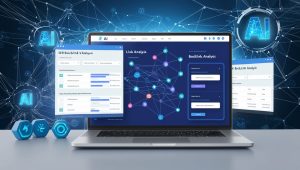AI SEO Revolution: How Search is Changing
Introduction: The AI SEO Revolution
If you are keeping a finger on the pulse of the dynamic nature of digital marketing, you know that there is a game changer that is transforming the basic core of Search Engine Optimization (SEO): Artificial Intelligence (AI). With an exciting new era of search technology approaching, it’s critical for marketers, content creators and business owners alike to recognize the significant effects AI is having on our approaches to SEO. This article examines the AI SEO revolution and how these intelligent algorithms are revolutionizing everything from keyword research to content creation and website ranking.

Use of AI in SEO is not just a passing trend; it contains a core change in the way search engines perceive and serve content to its users. Around that time, we’re experiencing a seismic shift in how search engines interpret user intent and serve results, but not because we suddenly wised up and started making better queries. This change is not just impacting how we optimize web pages, but also how we think about the whole search experience itself.
Join us in this voyage into AI’s contribution to SEO and discover the best SEO AI tools making marks around the world helping marketers stay ahead of the game. There we’ll cover the nitty-gritty of AI-Powered Keyword Research, Content Optimization, and more such as how AI is transforming backlink analysis and website ranking. By the time you reach the end of this journey, you’ll understand fully how AI is reshaping the landscape of SEO — and more importantly, how you can take advantage of those changes to grow your online presence.
The Foundation of AI in SEO
Informed Search in AI: A Detailed Explanation
Informed search-forming the cornerstone of AI SEO revolution. Traditional search algorithms focused heavily on keyword matching, while informed search uses AI to take into account the context, intent and nuances of user queries. This development has significant consequences for SEO:
- Contextualized Results: The integration of AI algorithms allows search engines to examine the user’s search history, onboarding location, and the current socio-political climate to propose more relevant results.
- Natural Language Processing (NLP): Search engines can now understand natural language queries, so optimizing for voice search is essential.
- Intent Mapping: A combined AI can understand what you looking for whether to buy, to know or to find information.
In response to this change, SEO has to go beyond merely optimising for keywords. For example, content writers should consider full topic coverage, best related answers to users’ other questions, more information on relevant aspects of the user’s intent, changes in their information-seeking behaviour, etc.
An Increase in the Use of AI-Driven SEO Tools
AI SEO has introduced a new era of tools. These tools help marketers navigate the complex terrain.. Here’s a rundown of some of the top SEO AI tools that are changing the game:
- Content Optimization Tools:
- io: Leverages AI to study high-ranking content and recommends optimization strategies.
- MarketMuse: AI-powered content strategy and optimization
- Keyword Research Tools:
- SEMrush’s Topic Research: Uses AI to generate topics and questions around them.
Keywords Explorer From Ahrefs: Uses machine learning for increased accuracy in keyword difficulty scores.
- AI Writing Helpers/Rewrite Tools:
- Jasper (formerly Jarvis): Creates SEO-optimized text based on user description.
- ai: Generates highly contextual marketing copy from a variety of data.
- Auditing Tools for Technical SEO
- Botify : Machine learning for large-scale technical SEO analysis.
- Deep Crawl: Uses AI to help conduct site-wide audits and to discover issues
- AI Backlinks Analysis Tools:
- Majestic: Uses AI for link quality and relevance assessment.
- Link Research Tools: Uses machine learning for detailed backlink analysis and black link discovery.
By leveraging these AI-powered tools, SEO professionals can, as a result, gain deeper insights, automate time-consuming tasks, and, most importantly, make more informed decisions about their optimization strategies.
Content Creation and Optimization using Artificial Intelligence
AI Changing the Game for Content Strategy
The content generation and optimization game has changed with the revolution AI SEO. Here’s how AI is changing this important facet of SEO:
Topic Clustering for Content Planning:
It makes use of machine learning algorithms that can scour through millions of platforms that give you information about related topics and subtopics. For instance, Artificial intelligence tools such as Market Muse do assistance for you to develop content clusters, which means a collection of articles that cover a subject area as comprehensively as possible, increases your likelihood of ranking overall for any juice of keywords you may generate.
Actionable Tips: AI-powered content planning tools can help you build a content calendar and plan your coverage for every aspect of your main topics. If your main keyword is “digital marketing,” for example, the AI would suggest you build clusters around “social media marketing,” “email campaigns” and “SEO strategies,” among others. Write detailed content for the different sub-topics, link them to each other, and see your topical authority build up.
AI-Generated Content:
AI will not (and cannot) fully replace human creativity, but it will dramatically enhance the content creation process. Platforms such as Jasper and GPT-3 based tools have demonstrated their ability to draft, outline, and even write complete articles on any prompt.
Actionable Tip: Use ai writing assistants for overcoming writer’s block or for creating initial drafts. Input your target keyword “AI website ranking” into Jasper, then request an outline for a blog post. Refine the AI-generated outline and have it serve as the basis for your article, filling it up with examples and unique insights.
Search Intent Based Content Optimization
AI tools can find the content that ranks well in SERP for your keyword and analyze it to offer you a brief on how the audience wants information on that topic, how effective content is structured around that search intent, etc.
Actionable Tip: Use an AI optimization tool, such as Frase, after writing your content. io. The tool shows how your content compares to the top competitors and adds suggestions on how to improve. For example, if you’re writing about “keyword tool AI,” the tool might recommend that you add a section titled “How to interpret AI-generated keyword data,” based on what is commonly found on articles that rank high on the topic.
Content Recommendation By AI:
AI algorithms can track user behavior to tailor personal content recommendations that results in better engagement and lower bounce rates.
Actionable Tip: Use the AI optimization tool Frase to refine your content post-writing. io. The tool compares your copy to your best-ranking competitors and suggests ways to improve. If you were writing for example about “keyword tool AI,” the tool would suggest including a section on “How to interpret AI generated keyword data,” for example, because it’s common among those articles that rank high on the subject.
Here are some of the applications of LLMs in SEO:
AI algorithms can also examine user behavior and recommend specific content to each user, enhancing engagement and decreasing bounce rates.
Actionable Tip: Implement an AI-powered recommendation engine on your website. For example, if a user reads an article about “AI backlinks analysis,” the system could suggest related content like “How to use AI for link building” or “The impact of AI on backlink quality assessment,” keeping the user engaged with your site longer.
AI in Technical SEO and Site Structure
The impact of AI extends beyond content creation, revolutionizing technical SEO practices:
Automated Technical Audits:
AI-powered tools can crawl websites at scale, identifying technical issues that could impact search performance.
Actionable Tip: Use a tool like DeepCrawl to perform a comprehensive technical audit of your site. The AI will identify issues like broken links, duplicate content, or page speed problems. Prioritize fixing the issues that have the most significant impact on your core pages first.
Intelligent Internal Linking:
AI can analyze your site structure and content to suggest optimal internal linking strategies, improving site navigation and distributing link equity more effectively.
Actionable Tip: Implement an AI-driven internal linking tool like InLinks. It will analyze your content and automatically suggest relevant internal links. For example, if you have a new article about “AI in content marketing,” the tool might suggest linking it to your existing pages about “content strategy” and “marketing automation.”
Schema Markup Generation:
AI tools can automatically generate and implement schema markup, improving your site’s visibility in rich snippets and knowledge panels.
Actionable Tip: Use a tool like Schema App to automatically generate and implement schema markup across your site. This can significantly improve your chances of appearing in featured snippets for queries related to your target keywords, like “best SEO AI tools” or “AI website ranking factors.”
The Future of SEO: AI-Driven Predictions and Strategies
As we look towards the horizon of SEO, it’s clear that AI will continue to play an increasingly pivotal role. Here are some predictions and strategies to help you stay ahead in the AI-driven SEO landscape:
Voice Search Optimization:
With the rise of voice-activated devices, optimizing for conversational queries will become crucial.
Actionable Strategy: Focus on creating content that answers specific questions. Use tools like AnswerThePublic to identify common questions in your niche, and create FAQ sections on your pages. For example, if you’re targeting “AI SEO revolution,” create content that answers questions like “How has AI changed SEO?” or “What are the benefits of AI in SEO?”
Visual Search Enhancement:
AI-powered visual search is becoming more sophisticated, making image optimization more critical than ever.
Actionable Strategy: Use AI-powered image recognition tools to optimize your visual content. Ensure all images have descriptive file names, alt text, and captions. For infographics about “AI backlinks analysis” or “keyword tool AI,” include textual descriptions that capture the key information for both users and search engines.
Predictive Search and User Intent:
AI will become even better at predicting user needs and serving content proactively.
Actionable Strategy: Use AI tools to analyze user behavior on your site and create predictive content strategies. For instance, if users who read about “informed search in artificial intelligence” often search for “AI implementation in SEO” next, create content that bridges this gap and suggest it proactively.
AI-Driven SERP Analysis:
As search results become more dynamic and personalized, AI tools for SERP analysis will be essential.
Actionable Strategy: Invest in advanced SERP analysis tools that use AI to track and interpret SERP features, competitor movements, and ranking fluctuations. Use this data to adjust your content strategy in real-time, ensuring you’re always aligned with the latest SERP trends for your target keywords.
Ethical AI and SEO:
As AI becomes more prevalent, there will be an increased focus on ethical AI practices in SEO.
Actionable Strategy: Stay informed about AI ethics in SEO. Ensure that your use of AI tools complies with search engine guidelines and prioritizes user value. For example, when using AI-generated content, always review and enhance it with human expertise to ensure it provides genuine value to your audience.
Conclusion: Embracing the AI SEO Revolution
The integration of AI in SEO is not just changing the rules of the game; it’s redefining the playing field entirely. From informed search in artificial intelligence to AI-powered content creation and technical optimization, the possibilities are both exciting and vast. As we’ve explored, the best SEO AI tools are enabling marketers to work smarter, not harder, providing insights and capabilities that were once thought impossible.
The key to success in this new era lies in embracing these AI-driven changes while maintaining a focus on providing genuine value to users. It’s about using AI backlinks analysis to build stronger, more relevant link profiles, leveraging keyword tool AI to uncover untapped opportunities, and employing AI website ranking techniques to climb the SERPs more effectively.
As we stand at the forefront of this AI SEO revolution, one thing is clear: those who adapt and leverage these new technologies will be the ones who thrive in the search landscapes of tomorrow. The future of SEO is here, and it’s powered by AI. Are you ready to revolutionize your SEO strategy?
Call to Action
Don’t let the AI SEO revolution pass you by. Start implementing these AI-driven strategies today to transform your SEO efforts and stay ahead of the competition. Whether it’s experimenting with AI content tools, diving deep into AI-powered keyword research, or revamping your technical SEO with AI audits, take the first step towards future-proofing your digital presence.
Ready to elevate your SEO game with AI? Contact us for a personalized AI SEO audit and discover how we can help you harness the power of artificial intelligence to skyrocket your search rankings!




